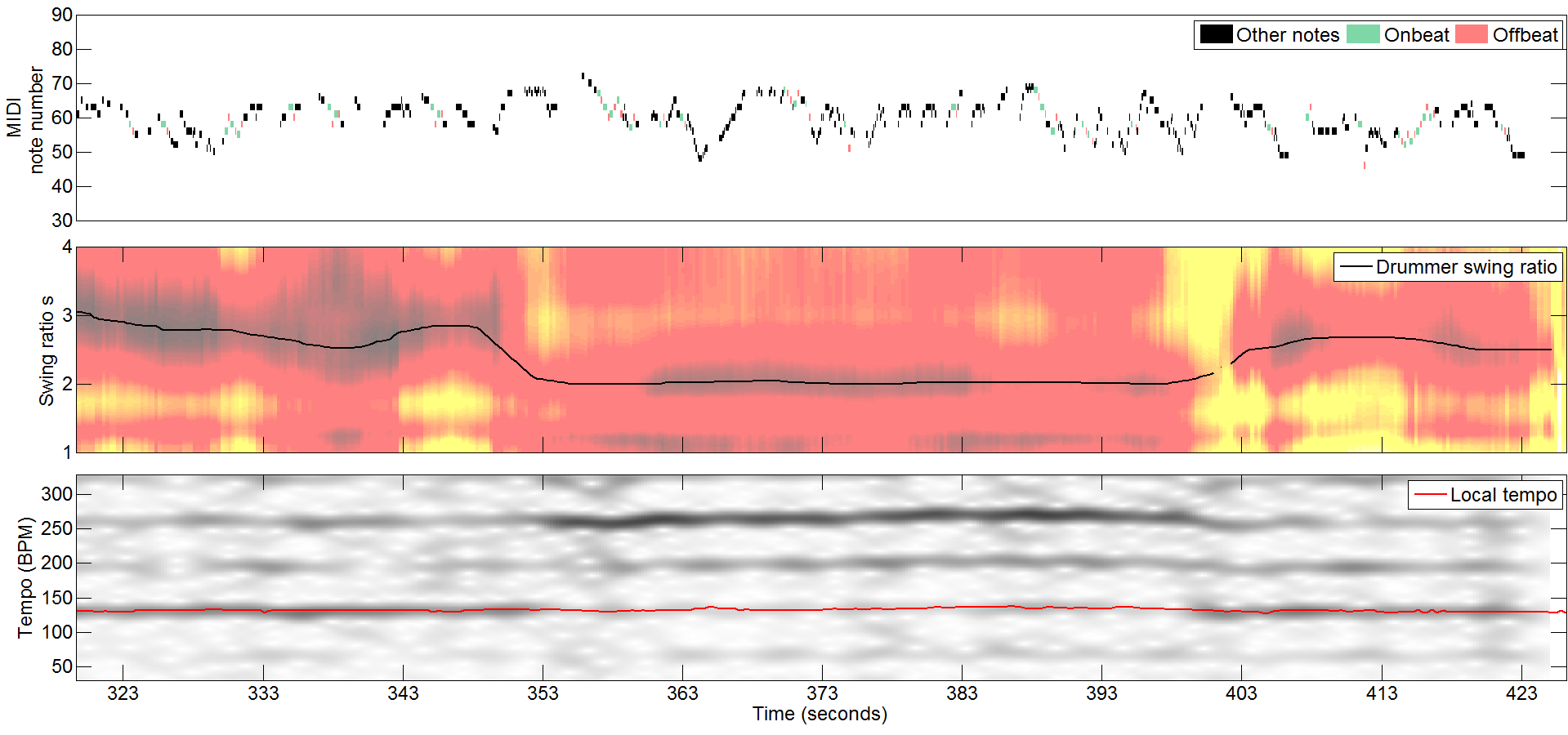A Swingogram Representation for Tracking Microrhythmic Variations in Jazz Performances
| [Back to Main Page] |

Discussion
In the figures above, we show the piano-roll, swingogram, and tempogram of a solo section from the 1957 recording of "Blue Train," featuring solo trombone player Curtis Fuller and drummer Philly Joe Jones. At an average tempo around 132 BPM, the ride cymbal swing ratio starts around 3.0 and drops in the middle part to 2.0, rising again to 2.5 after 20 seconds. The change in swing ratio is coupled with the start of a completely different drum pattern. Throughout that middle part, the ride cymbal plays only onbeats (i.e., quarter notes), while the hi-hat is placed on straight offbeats, thus conveying a double-time feel (i.e., the impression of twice the tempo). This is supported by the tempogram in the lowest panel, where the periodicity representing 260 BPM appears more salient than before. On closer inspection, we found that swinging offbeats in the middle part are played solely on the snare. Still, the snare hits lead to spikes in the novelty function due to crosstalk into the ride cymbal frequency band. Interestingly, both the bassist Paul Chambers and trombonist Curtis Fuller do not follow the rhythm change immediately, but soon Fuller switches to sixteenth note sequences, supporting the double time feel.
Legal notice
The video linked on this page are given for educational purposes only. If any legal problems occur, please contact us. Any content that allegedly infringes the copyright of a third party will be removed upon request by the copyright holder.
References
- Christian Dittmar, Martin Pfleiderer, and Meinard Müller
Automated Estimation of Ride Cymbal Swing Ratios in Jazz Recordings
In Proceedings of the International Conference on Music Information Retrieval (ISMIR): 271–277, 2015. PDF@inproceedings{DittmarPM15_Swing_ISMIR, author = {Christian Dittmar and Martin Pfleiderer and Meinard M{\"u}ller}, title = {Automated Estimation of Ride Cymbal Swing Ratios in Jazz Recordings}, booktitle = {Proceedings of the International Conference on Music Information Retrieval ({ISMIR})}, address = {M\'{a}laga, Spain}, year = {2015}, pages = {271--277}, url-pdf = {http://ismir2015.uma.es/articles/143_Paper.pdf} } - Peter Grosche and Meinard Müller
Extracting Predominant Local Pulse Information from Music Recordings
IEEE Transactions on Audio, Speech, and Language Processing, 19(6): 1688–1701, 2011. Details DOI@article{GroscheM11_PLP_TASLP, author = {Peter Grosche and Meinard M{\"u}ller}, journal = {IEEE Transactions on Audio, Speech, and Language Processing}, title = {Extracting Predominant Local Pulse Information from Music Recordings}, number = {6}, publisher = {IEEE}, volume = {19}, year = {2011}, pages = {1688--1701}, doi = {10.1109/TASL.2010.2096216}, url-details = {https://www.audiolabs-erlangen.de/resources/MIR/tempogramtoolbox} } - Matthias Gruhne and Christian Dittmar
Improving Rhythmic Pattern Features Based on Logarithmic Preprocessing
In Proceedings of the Audio Engineering Society (AES) Convention, 2009. PDF@inproceedings{GruhneD09_LogLagACF_AES, author = {Matthias Gruhne and Christian Dittmar}, title = {Improving Rhythmic Pattern Features Based on Logarithmic Preprocessing}, booktitle = {Proceedings of the Audio Engineering Society ({AES}) Convention}, address = {Munich, Germany}, year = {2009}, url-pdf = {http://www.aes.org/e-lib/browse.cfm?elib=15013}, } - Fernando Benadon
Slicing the beat: Jazz eighth-notes as expressive microrhythm
Ethnomusicology: 73–98, 2006. PDF@article{Benadon06_SwingRatio_EM, title = {Slicing the beat: Jazz eighth-notes as expressive microrhythm}, author = {Fernando Benadon}, journal = {Ethnomusicology}, pages = {73--98}, year = {2006}, publisher = {JSTOR}, url-pdf = {https://www.jstor.org/stable/pdf/20174424.pdf}, } - Anders Friberg and Andreas Sundström
Swing Ratios and Ensemble Timing in Jazz Performance: Evidence for a common Rhythmic Pattern
Music Perception, 19(3): 333–349, 2002. PDF@article{FribergS02_SwingRatio_MP, title = {Swing Ratios and Ensemble Timing in Jazz Performance: Evidence for a common Rhythmic Pattern}, author = {Anders Friberg and Andreas Sundstr{\"o}m}, journal = {Music Perception}, volume = {19}, number = {3}, pages = {333--349}, year = {2002}, publisher = {JSTOR} url-pdf = {https://www.jstor.org/stable/pdf/10.1525/mp.2002.19.3.333.pdf}, }

